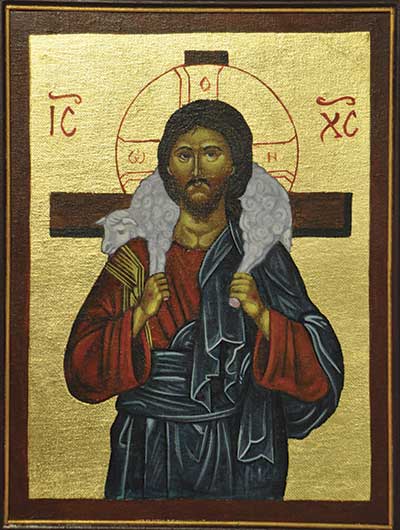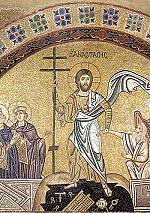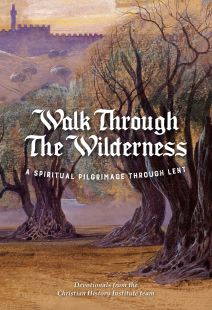Lent Week Four

[Icon: Christ the Good Shepherd—Daryl C (incarcerated artist), 2011]
Fourth Sunday
The LORD is my shepherd; I shall not want.
(Psalm 23:1)
For by grace you have been saved through faith, and this is not your own doing; it is the gift of God—not the result of works, so that no one may boast.
(Ephesians 2:8–9)
We had to celebrate and rejoice, because this brother of yours was dead and has come to life; he was lost and has been found.
(Luke 15:32)
Monday, Fourth Week of Lent
Loving Shepherd of your sheep,
all your lambs in safety keep;
nothing can your power withstand,
none can pluck them from your hand.
—Jane Eliza Leeson (1808–1881), “My Sheep Hear My Voice”
Nothing in my life thus far has prepared me for the anxieties of parenthood. While each new stage has its joys, it also comes with a new set of worries—as, for example, when I dropped my daughter off at overnight camp for the first time this past summer. Panic enveloped me as we neared the camp. Will she be safe? Will she miss us too much? Will she make friends? Will she be okay?
Even when the kids are home, I often find myself double-checking beds in the wee hours of the night, crippled with fear over their well-being. In those times, when I lie awake and trembling, the Spirit faithfully guides me to the words of Psalm 23.
Believers throughout the ages and the world have long sought the comfort found in this psalm and for good reason. What a balm it is to the soul to know God loves us and the people whom we love far more than we can comprehend! What peace there is in his power, to know he sustains, protects, and even blesses us in the presence of enemies. How he answers when we call out in our terror and fragility: “Behold, I am with you always, to the end of the age.”
The next time that anxiety rushes over you like a wave, seek the still waters of Psalm 23 in the arms of your loving shepherd, who restores your fearful soul. Take heart, little sheep! Nothing can pluck you from his hand.—Kaylena Radcliff
Tuesday, Fourth Week of Lent
I went very unwillingly to a society . . . where one was reading Luther’s Preface to the Epistle to the Romans. . . . While he was describing the change which God works in the heart through faith in Christ, I felt my heart strangely warmed. I felt I did trust in Christ, Christ alone, for salvation; and an assurance was given me that He had taken away my sins, even mine, and saved me from the law of sin and death.
—John Wesley (1703–1791), Journal
On Always Being Somewhere Relative to the Cross:
Or How to Have a 13-Year-Long Instantaneous Conversion
(Dedicated to the memory of John Wesley)
Almost a Christian,” almost persuaded,
Knowing, despairing, the one thing needed,
Lost in the shambles of works collapsing,
Never quite trusting, but always asking:
What can I do that will make me holy?
Where can I go to find him fully?
Curses with blessing, grasping and falling,
Caught in a net, still drawing, pulling,
Nothing but rags of myself to trust in,
Nothing to answer the haunting question,
Turned upside down and going under—
Until the skies were rent asunder.
Yet though a moment brought grace descending
(Journey’s beginning as much as ending)
Still all the time there was grace pursuing,
Through all my striving the constant wooing,
Ever the standing against me leaving,
Whispering gently and deeply grieving.
Through all my doubting and my assenting,
All of my searching—his unrelenting
Love was forever atoning, rising,
Turning me round again, still surprising.
The wonder was not that he won me to him;
The wonder was how long before I knew him.
—Jennifer Woodruff Tait
Wednesday, Fourth Week of Lent
Thou hast promised to receive us,
Poor and sinful though we be;
Thou hast mercy to relieve us,
Grace to cleanse, and pow’r to free.
—Dorothy Thrupp (1779–1847), “Savior, Like a Shepherd Lead Us”
When I was a child, my mother (a United Methodist Church musician) and my father (a United Methodist pastor and a musician) frequently performed musical programs for their congregations. One of my earliest memories is of them singing this hymn written in 1836. As with many other great hymns of the church, it draws inspiration from Psalm 23, which pictures God as our shepherd.
Little is known about Dorothy Thrupp other than that she was a prolific writer of hymns for children in nineteenth-century Britain—so it’s no accident that her words touched me as a young person. Although this is her best-known hymn today, during her life she was known for another hymn, “A Little Ship Was on the Sea.” It tells the story of Mark 4:35–41, in which Jesus tells the storm to be still, and it ends with these beautiful lines:
O well we know it was the Lord, our Saviour and our Friend,
whose care of those who trust his word will never, never end.
I’ve been without my mom now for 14 years and my dad for 3. For me Thrupp’s words in both hymns beautifully picture the abundant grace of the Christ they served, who relieves, cleanses, frees, and stills our lives’ storms. Indeed the care of those who trust his word will never, never end. —Jennifer Woodruff Tait
Thursday, Fourth Week of Lent
Therefore most evidently are we bidden by the teaching of the Lord to confer again the grace of the heavenly sacrament on those guilty even of the greatest sins, if they with open confession bear the penance due to their sin.
—Ambrose (c. 339–c. 397), Concerning Repentance,
translated by Augustus Henry Eugene De Romestin (1830–1900)
In the late fourth century, Ambrose, bishop of Milan, penned a book in response to the Novatian heresy. Novatian had lived several generations previous and, after the Decian persecution, had required extreme penance for those who had denied Christianity and had barred them from the Lord’s Supper. The Novatians, his successors, expanded this practice into a system distinguishing lighter sins from “grievous sins” and requiring rebaptism for gross perpetrators, while still keeping them from full participation in the life of the church.
Ambrose’s response, Concerning Repentance, systematically combs the Scriptures to describe the true nature of repentance and the depth of God’s mercy. Ambrose argued that barring sinners from communion with Christ and the church was keeping the sick from their physician. Beginning in the Old Testament, he reflected on pre-atonement expressions of God’s longing for sincere repentance by his people. Moving to the New Testament, and responding directly to those who had denied their faith under persecution, Ambrose argued that there was even hope for those who fell in persecution: “[Jesus] makes more of that which is merciful. He makes less of what is penal.”
In the wilderness of Lent, I sometimes feel drawn to an utter mortification of myself; focusing on my own sin and the lengths to which I might go to show God I don’t deserve his mercy—without resting in the very mercy by which I am healed. Just as Ambrose advocated for the presence of Christ in the Eucharist to be ministered to even the worst of repentant sinners, so Christ himself instituted the first Lord’s Supper when he knew his disciples, in a matter of hours, would fall asleep, scatter, and even deny him. This is indeed a scandalous mercy. Only once we understand the depth of our sin and our need for penance are we offered Christ’s body and blood, both the diagnosis of and the medicine for our disease.
Friday, Fourth Week of Lent
Let all multiplicity be absent from your prayer. A single word was enough for the publican and the prodigal son to receive God’s pardon. . . . Do not launch into long discourses, for if you do, your mind will be dissipated trying to find just the right words. The publican’s short sentence moved God to mercy. A single word full of faith saved the thief.
—John Climacus (c. 579–649)
When I was a child, I used to get bored by my parents’ long prayers. During our family devotions, they would pray for everyone we knew, and as a 10-year-old, I was ready to get on to game time. So one evening before prayer time, I offered to read a Bible verse before we prayed. I read, “When you are praying, do not heap up empty phrases as the gentiles do, for they think that they will be heard because of their many words. Do not be like them, for your Father knows what you need before you ask him” (Matt. 6:7–8). I felt very clever, having proven that my preference for shorter prayers was biblical.
John Climacus’s instruction reminds me so much of my childhood plea. Yet as an adult, I see that his motives were different from my own. Climacus isn’t so much instructing us not to bore children (or adults!) with long prayers, but rather to come to God in simplicity, focused on God rather than on the eloquence of our own words. The prodigal son had prepared a whole speech, yet he only had to show up to receive his father’s grace.
I’ve heard so many people say they are “not good at praying.” And I wonder if striving for well-articulated prayers as I do also contributes to others feeling that they do not have the right words to come to God. Yet when Jesus taught his disciples to pray, he gave them the concise words of the Lord’s Prayer.
Whether you think of yourself as “good at praying” or not, I challenge you today to take Climacus’s advice. Come to God with a single word or short prayer. Maybe the words of the tax collector from Jesus’s parable in Luke 18, “God, be merciful to me, a sinner.” Or the words Jesus teaches in the Lord’s Prayer. Or a repetition of Psalm 23:1, “Lord, you are my shepherd, I shall not want.” Come to God with just a few words, and focus on how God receives and welcomes you in such simplicity.—Michelle Curtis
Saturday, Fourth Week of Lent
Here lies the dust of a poor hell-deserving sinner who ventured into eternity trusting wholly on the merits of Christ for salvation. In the full belief of the great doctrines he preached while on earth, he invites his children, and all who read this, to trust their eternal interest in the same foundation.
—Epitaph of Lemuel Haynes (1753–1833)
I did not grow up in a church tradition where funerals usually involved altar calls. The funerals of my childhood presented the love of Christ and spoke of how the deceased now rested in the presence of Christ, but the liturgy did not generally call on hearers to decide their own eternal destiny at that moment.
For that reason Lemuel Haynes’s epitaph startled me just a little when I first encountered it. Haynes was a mixed-race veteran of the American Revolution, abolitionist, and Congregational pastor. His parentage is to this day uncertain, and at five months old, he became an indentured servant to a Massachusetts farmer (what service a five-month-old could have rendered to anyone seems quite unclear!). When Haynes turned 21, he was freed and joined the army. Throughout his life he campaigned against slavery, and in 1788 he became the first Black man to be ordained in the new United States.
Meditating on Haynes’s tumultuous life, though, I thought of one of this week’s Scriptures: “For by grace you have been saved through faith, and this is not your own doing; it is the gift of God—not the result of works, so that no one may boast” (Eph. 2:8–9). From his childhood conversion until the end, this belief obviously sustained Haynes so strongly that even on his tombstone he wanted to make sure others knew where to find what he had found. And that—as they said even in my childhood tradition—will preach.—Jennifer Woodruff Tait
By CHI Staff and Associates
[Christian History originally published this article in Christian History Issue #143+ in 2022]
Next articles
Holy Week in Lent
Scriptures and meditations for Passion week (holy week) in Lent
CHI Staff and AssociatesSupport us
Christian History Institute (CHI) is a non-profit Pennsylvania corporation founded in 1982. Your donations support the continuation of this ministry
Donate






